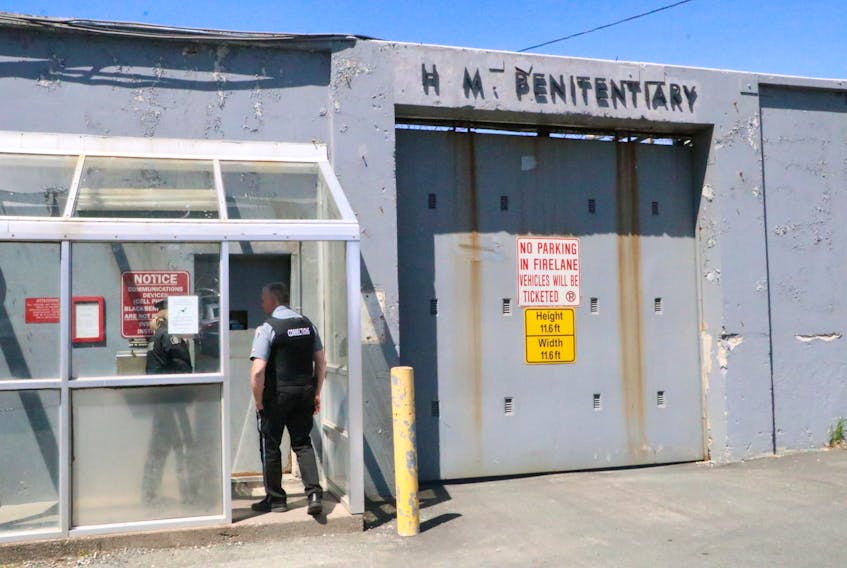It was proposed a long time ago, discussed countless times over the years and has even been planned to be implemented.
Yet, corrections officers in this province still lack the specific training needed to properly deal with mentally ill inmates.
“It’s something they had talked about years ago … but there’s no one to facilitate it,” a corrections officer (CO), who wanted to remain anonymous, told The Telegram Thursday.
“They’ve always wanted (to train us) and I’m saying it’s on the backburner, but it seems something always comes up that’s more important.”
According to a report into recent deaths of four inmates — Skye Martin, Douglas Neary, Samantha Piercey and Christopher Sutton — between Aug. 31, 2017, and June 30, 2018, only four per cent of COs who work at correctional institutions in this province, including Her Majesty’s Penitentiary in St. John’s and the Newfoundland and Labrador Correctional Centre for Women in Clarenville, have mental health first aid training, while only 54 per cent have first aid training.
Compare that to the estimated 80 per cent of inmates across the country who are estimated to have a mental health and addictions issue.
The report, which was carried out by retired RNC Supt. Marlene Jesso and was released publicly Wednesday, found that while there was no specific wrongdoing on the part of prison staff that resulted in the deaths, there are several systemic problems, including the lack of proper training for corrections officers in the areas of suicide intervention/prevention and first aid.
Jesso found that while prison policy states that all correctional officers will receive such instruction, results were contradictory, as documentation didn’t support that assertion. Certification had expired in many cases, while for others, expiry dates hadn’t been recorded.
“This indicates the provision of training to correctional officers is not a priority,” Jesso wrote in the report, adding that it’s management’s responsibility to ensure such training is completed. “If training is not up to date, it contributes negatively to an officer’s ability to properly respond to situations, especially in mental health-related situations.”
Rose Ricciardelli, a sociology professor at Memorial University specializing in correctional facilities, says the mental health training for COs is available, but without the proper resources, it’s nearly impossible for existing COs to take advantage.
“We judge a society in general by how we treat those we incarcerate,” Ricciardelli said.
“We treat those that we incarcerate and we treat the staff who oversee those incarcerated pretty terribly.”
Road To Mental Readiness is a training program initially designed for use in the military and generally for first responders. It’s being implemented for COs in this province currently, but to date only two trainers have been trained to hold workshops. While Ricciardelli says that’s a good step, there’s no way to avail of the training if prisons are so understaffed that COs can’t afford even an afternoon to get the training.
Ricciardelli says there needs to be a fundamental re-thinking of how society handles incarceration. She says the public needs to make it clear that proper treatment of inmates is a priority.
“If we have a society that believes that we should lock people away, then we’re not going to make an impact and it’s not going to stick,” she said.
“We should start reflecting first on ourselves in society and why we don’t fund staff enough so we can have the staff in there who can do their job effectively and be able to take the training.”
If there are too few staff, with too few resources, unable to avail of the proper training, then it becomes harder and harder for COs to do their job as well as they want to.
“Unless an inmate tells them they’re suicidal or shows blatant signs they are a danger to themselves, COs likely can’t recognize if an inmate needs mental health treatment.”
“We can’t read minds,” the CO said.
If an inmate does present as suicidal, the CO said, the policy is to segregate the inmate and put him or her on suicide watch, “and unfortunately, they stay there until they’re seen by a psychiatrist,” which could take time. An inmate can remain in segregation for weeks if, after seeing a psychiatrist, they’re still deemed to be suicidal.
One of the issues found was that with low staffing levels and lack of resources, training is often cancelled or not scheduled.
“It’s tough to get training when our numbers don’t allow it,” the CO said. “In the past, years ago, we had some kind of suicide training, but we found policies and procedures override that.
“We don’t have the time to spend with one inmate, to sit and talk to see if they need help because, No. 1, we don’t have the manpower to do it, and No. 2, it’s just time we don’t have.
“There could be a hospital admission or there’s recreation time. There are just so many others who require (our service) in the run of a day. … You can be on a unit with 21 (inmates) and just you, so that’s 21 people who need your attention.”
The CO is glad the issue of mental health treatment is coming to the forefront and hopes the report will bring about change.
“We want the training,” the CO said. “We need the training.”
Twitter: @TelyRosie and @DavidMaherNL









